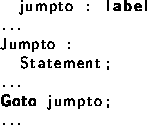Address factor

The address operator @ returns the address of a variable, procedure or function. It is used as follows:
Address factor
The @ operator returns a typed pointer if the $T switch is on. If the $T switch is off then the address operator returns an untyped pointer, which is assigment compatible with all pointer types. The type of the pointer is ^T, where T is the type of the variable reference.
For example, the following will compile

Changing the {$T-} to {$T+} will prevent the compiler from
compiling this. It will give a type mismatch error.
By default, the address operator returns an untyped pointer.
Applying the address operator to a function, method, or procedure identifier will give a pointer to the entry point of that function. The result is an untyped pointer. By default, you must use the address operator if you want to assign a value to a procedural type variable. This behaviour can be avoided by using the -So or -S2 switches, which result in a more compatible Delphi or Turbo Pascal syntax.